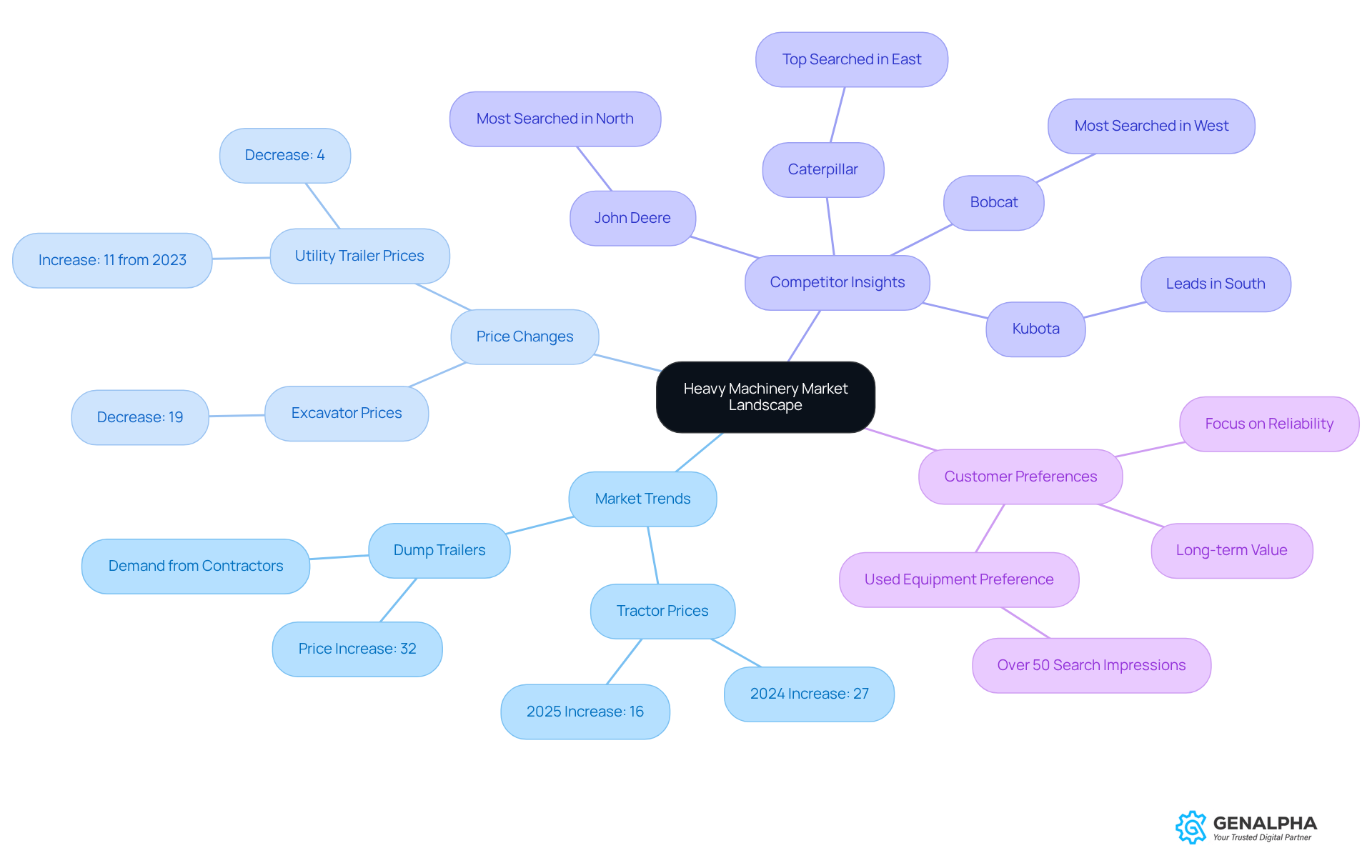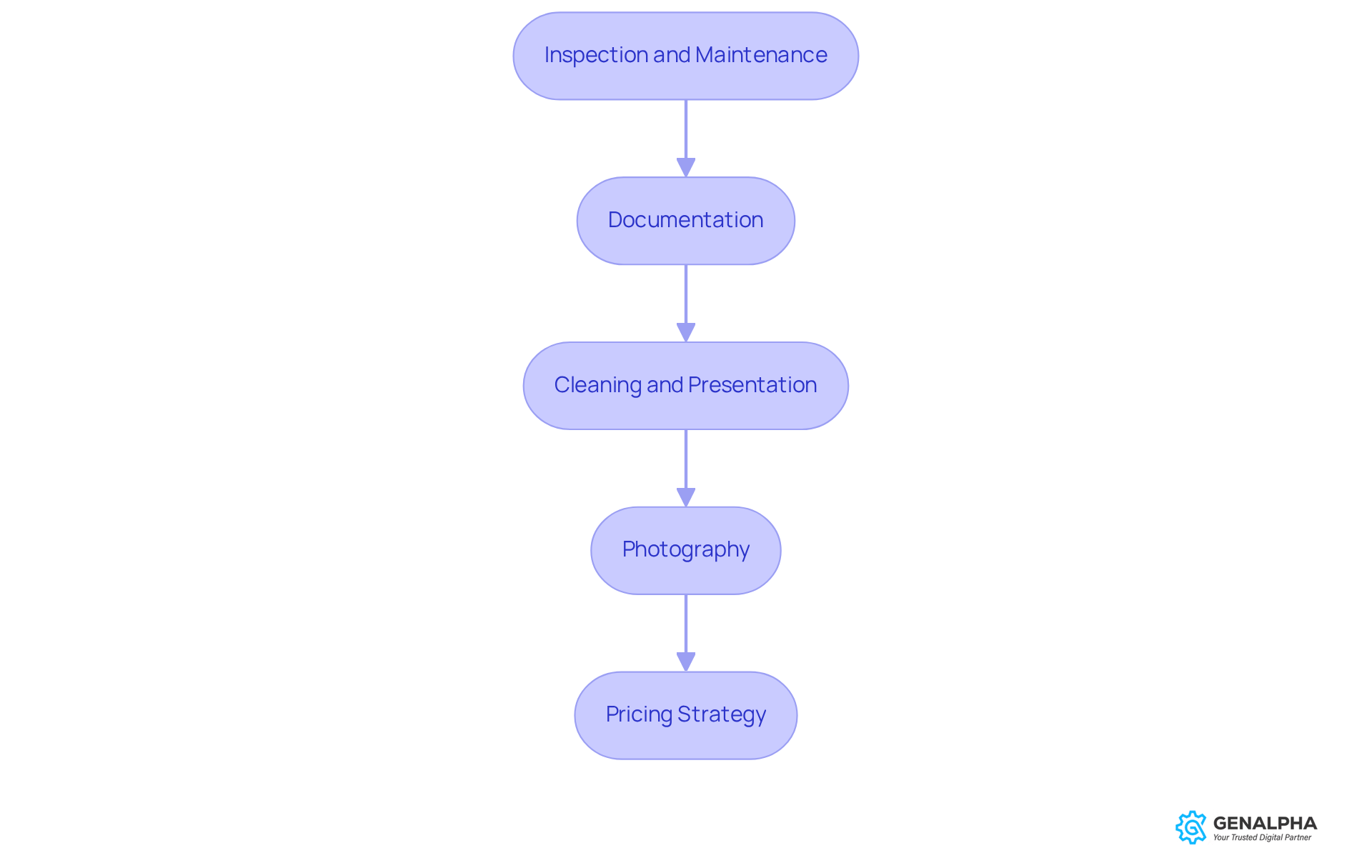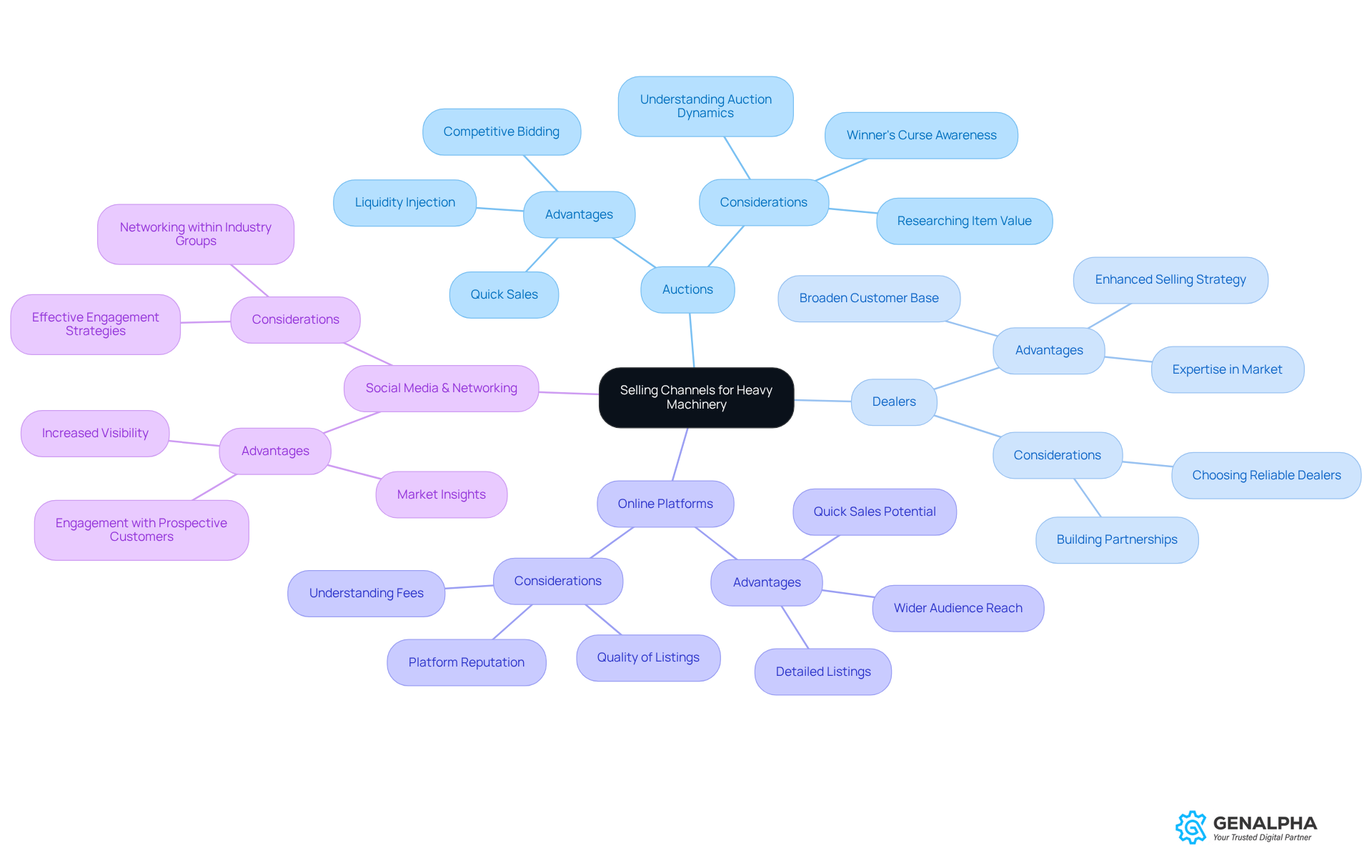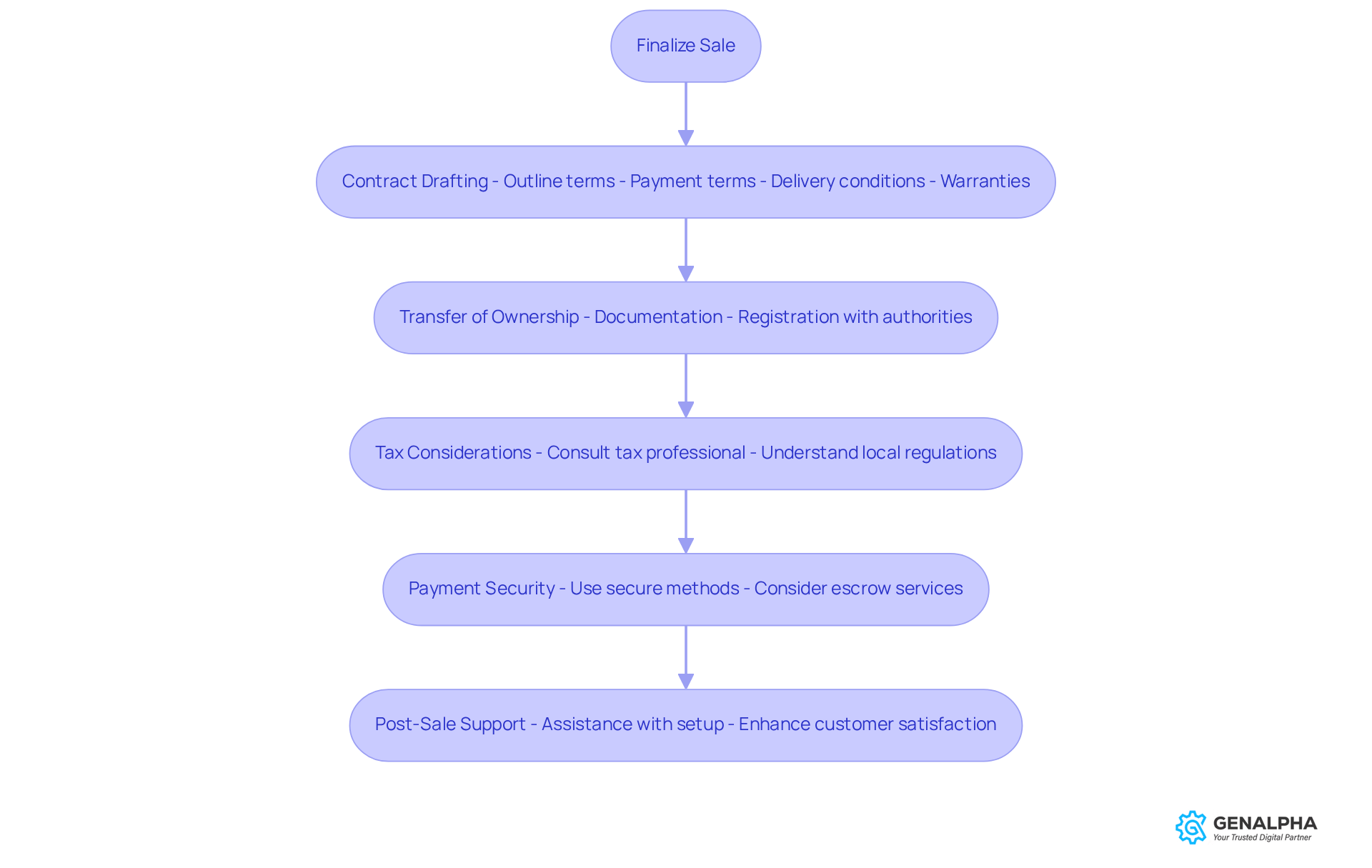Overview
This article serves as your go-to guide for manufacturers looking to sell heavy machinery effectively. Ever wondered what it takes to make a successful sale? Let’s dive into some essential steps together!
- Understanding the market landscape is crucial. You wouldn’t want to sell ice to an Eskimo, right?
- Prepare your machinery for sale—think of it as sprucing up your home before inviting guests over.
- Exploring various selling channels is also key. Are you considering online platforms, auctions, or maybe direct sales? Each has its perks!
- Navigate legal considerations. It might sound tedious, but it’s vital to ensure everything’s above board.
Remember, strategic planning and execution are the backbone of achieving successful sales outcomes. So, are you ready to take the plunge into the world of heavy machinery sales? Let’s make it happen together!
Introduction
Understanding the complexities of the heavy machinery market is crucial for manufacturers looking to thrive in today’s competitive landscape. This guide is your comprehensive roadmap for successfully selling heavy machinery. We’ll cover everything from market analysis to preparing equipment for sale and navigating those tricky legal considerations.
But with trends shifting and prices on the rise, how can you ensure that you’re not just keeping pace but also maximizing your profits? Let’s dive into some steps that will illuminate the path to mastering the art of selling heavy machinery, tackling both the opportunities and challenges that lie ahead.
Understand the Heavy Machinery Market Landscape
If you're looking to succeed in selling heavy machinery, it all starts with getting a solid grip on the current market landscape. Have you noticed how trends in demand for specific equipment categories can really shift? For example, tractor prices have jumped by 16% as we head into 2025, following a whopping 27% increase in 2024. This definitely points to some changes in supply and demand dynamics that we should pay attention to. Plus, dump trailers have seen a price hike of over 32% in the past year, thanks to strong demand from contractors and landscapers.
So, how can you stay ahead? Utilize industry reports and market analysis tools to gather the data you need. Benchmarking against competitors can also give you some great insights into their strategies. And don’t forget about customer preferences! What features are people really looking for right now? Reliability and long-term value are at the top of the list.
Understanding the competitive landscape is key too. For instance, did you know that John Deere is a favorite in the North while Caterpillar rules the East? This kind of knowledge can really enhance your positioning strategy. As Aysia Jackson wisely points out, "Keep value at the center: reliability, performance, and long-term return on your investment." With this foundational knowledge, you’ll be well-equipped to and refine your strategy for selling heavy machinery.

Prepare Your Machinery for Sale
Are you getting your machinery ready for selling heavy machinery? Let’s break it down into some key steps that can make a big difference!
- Inspection and Maintenance: First things first—give your equipment a good once-over. You want to spot any repairs it might need. Tackle those mechanical issues, do some routine maintenance, and check that all safety features are in tip-top shape. Did you know that aging equipment is a major culprit behind unplanned downtime, accounting for 44% of incidents? That’s why this step is so crucial for keeping things running smoothly. As Plant Engineering puts it, "Preventive maintenance is favored by 80% of maintenance personnel." Clearly, being proactive pays off!
- Documentation: Next up, gather all your important paperwork—maintenance records, warranties, and manuals. This info builds trust with potential buyers. In fact, 67% of manufacturing companies rely on preventive maintenance as their go-to strategy. Keeping detailed records can really show off the machine’s reliability and upkeep.
- Cleaning and Presentation: Now, let’s talk about cleaning. A thorough scrub can really boost your equipment's appeal. A well-presented machine is essential for selling heavy machinery, as it catches the eye and makes it more attractive to customers. If you want to go the extra mile, consider professional detailing; first impressions matter!
- Photography: Don’t forget to snap some great photos! Capture high-quality images from different angles to showcase your equipment's features and condition. Good visuals are essential for online listings when selling heavy machinery, as they can really draw in potential buyers.
- Pricing Strategy: Finally, it’s time to set your price. Do a little research on comparable equipment to find a competitive price point. Think about factors like age, condition, and market demand when deciding. A solid pricing strategy can lead to quicker sales and better returns on your investment when selling heavy machinery, especially when you have good documentation and maintenance history backing you up.
Ready to get started? With these steps, you’ll be well on your way to a !

Explore Selling Channels: Auctions, Dealers, and Online Platforms
When it comes to selling heavy machinery, have you considered the best channels to truly maximize your reach and effectiveness? Let’s dive into a few options that could make a big difference.
- Auctions: They’re a quick way to sell equipment, especially if you have high-demand items. Auctions can inject liquidity into your operations and help you make quick sales. Just make sure to check out credible auction firms that specialize in large equipment—they attract a specific group of buyers. Plus, the competitive bidding can sometimes drive prices higher than you might expect, especially in a hot market. But be cautious! Understanding auction dynamics is key, especially the 'Winner's Curse' theory, which suggests that the least informed bidder might overpay. So, do your homework! As Deborah Weidenhamer puts it, "Research, research, research" to ensure you know the true value of your equipment.
- Dealers: Partnering with established dealers can really broaden your customer base. A good vendor not only knows the equipment market but also has connections with potential clients. Look for dealers with a solid track record in selling heavy machinery transactions. Their expertise can really enhance your selling strategy. Successful partnerships often lead to better visibility and revenue, as dealers can tap into their networks to engage interested buyers. Statistics show that working with reliable dealers can boost your revenue results, making them a valuable resource in selling heavy machinery.
- Online platforms for selling heavy machinery should not be overlooked, especially those that cater specifically to heavy machinery transactions. Websites like MachineryTrader and other specialized platforms can help you reach a wider audience. Make sure your listings are detailed, with clear descriptions and high-quality images to catch potential buyers' eyes. Research indicates that well-presented listings can significantly ramp up engagement and lead to quicker sales.
- Social Media and Networking: Why not leverage social media platforms and industry networks to promote your machinery? Engaging with prospective customers through these channels can really boost your visibility and interest. Plus, networking within industry groups can provide valuable insights into market trends and buyer preferences, allowing you to tailor your approach effectively.
By strategically using these channels, you can streamline your selling process and achieve better results in the competitive equipment market. And don’t forget, understanding bidding strategies like proxy bidding and sniping can empower you in auction settings. Remember, keeping your emotions in check during auctions is crucial to avoid overbidding and ensure a successful transaction.

Navigate Legal Considerations and Finalize Transactions
Finalizing a sale in the selling heavy machinery sector can feel a bit daunting, right? But don’t worry! With a little guidance, you can navigate the legal considerations like a pro.
First up, let’s talk about contracts. A well-drafted transaction agreement is essential. It should clearly outline the terms of the transaction, including payment terms, delivery conditions, and warranties. It’s super important that both parties fully understand and agree to these terms to prevent any disputes down the line. Did you know that 95% of organizations aren’t fully aware of their contractual obligations? That really highlights how crucial clear agreements are in selling heavy machinery transactions.
Next, we have the transfer of ownership. Understanding this process is key! It usually involves specific documentation and might require registration with local authorities to ensure everything is legally compliant.
Now, don’t forget about tax implications. It’s wise to be mindful of any tax obligations linked to the transaction. Consulting with a tax professional can help you navigate local regulations and avoid any unexpected liabilities.
When it comes to , protecting yourself against fraud is vital. For high-value transactions, consider using secure payment methods like escrow services. They provide an added layer of security for both parties. It’s worth noting that poor contract management can lead to significant financial losses, with an estimated $140 billion wasted annually due to lack of collaboration between commercial and legal teams. That’s a lot of money!
Lastly, let’s discuss post-sale support. Providing assistance with setup or operation can really enhance customer satisfaction. This not only fosters trust but also helps build long-term relationships with clients, encouraging repeat business. However, it’s concerning that 89% of organizations feel their contract process is ineffective. This really underscores the need for improved practices in managing post-sale obligations.
By addressing these key areas, manufacturers can streamline their sales processes and mitigate potential risks associated with selling heavy machinery transactions. So, what steps will you take to ensure a smoother sale?

Conclusion
Mastering the art of selling heavy machinery isn't just about the equipment—it's about understanding the market and knowing how to connect with customers. Imagine diving into current trends and preferences; that's where manufacturers can really shine in a competitive landscape. The journey starts with a solid market analysis, moves through getting machinery ready for sale, explores various selling channels, and navigates the legal intricacies of transactions.
So, what are some key strategies? First off:
- Keeping equipment in top shape is vital.
- Presenting it attractively can make a huge difference.
- Don't forget about using both traditional and online platforms to reach as many potential buyers as possible.
- Engaging with established dealers and exploring auctions can boost visibility and might even lead to higher returns.
- Understanding the legal aspects and ensuring secure transactions is crucial for building trust and fostering long-term relationships with clients.
In the fast-paced world of heavy machinery sales, staying informed and adaptable is key. By embracing these best practices, you're not just increasing the chances of successful transactions; you're also contributing to the industry's overall growth. Prioritizing quality, transparency, and customer satisfaction is how manufacturers can truly thrive in this competitive sector and establish themselves as trusted providers in the heavy machinery market. So, are you ready to take your sales game to the next level?
Frequently Asked Questions
Why is it important to understand the heavy machinery market landscape?
Understanding the heavy machinery market landscape is crucial for success in selling equipment, as it helps identify trends in demand, pricing changes, and competitive strategies.
What recent trends have been observed in heavy machinery pricing?
Recent trends indicate that tractor prices have increased by 16% as we approach 2025, following a 27% rise in 2024. Additionally, dump trailers have seen a price hike of over 32% in the past year due to strong demand from contractors and landscapers.
How can one stay ahead in the heavy machinery market?
To stay ahead, one should utilize industry reports and market analysis tools, benchmark against competitors, and pay attention to customer preferences, particularly regarding reliability and long-term value.
What are the top customer preferences in heavy machinery?
The top customer preferences in heavy machinery include reliability and long-term value.
How does understanding the competitive landscape affect selling heavy machinery?
Understanding the competitive landscape helps refine positioning strategies. For example, knowing that John Deere is popular in the North and Caterpillar dominates the East can inform sales tactics.
What advice does Aysia Jackson provide regarding selling heavy machinery?
Aysia Jackson advises to "keep value at the center," focusing on reliability, performance, and long-term return on investment to enhance selling strategies.




